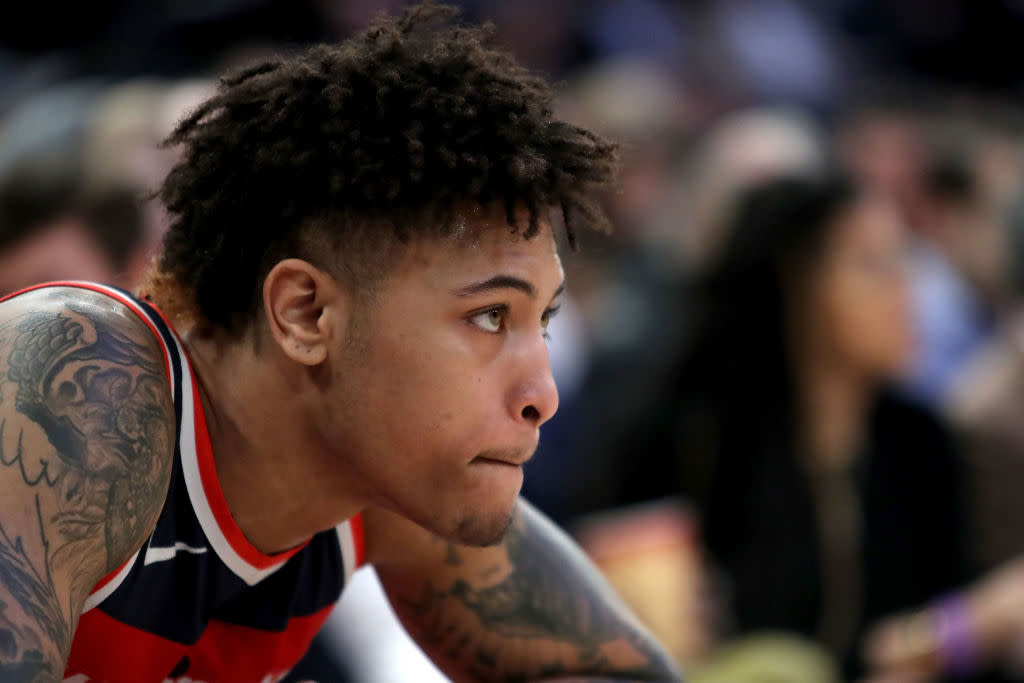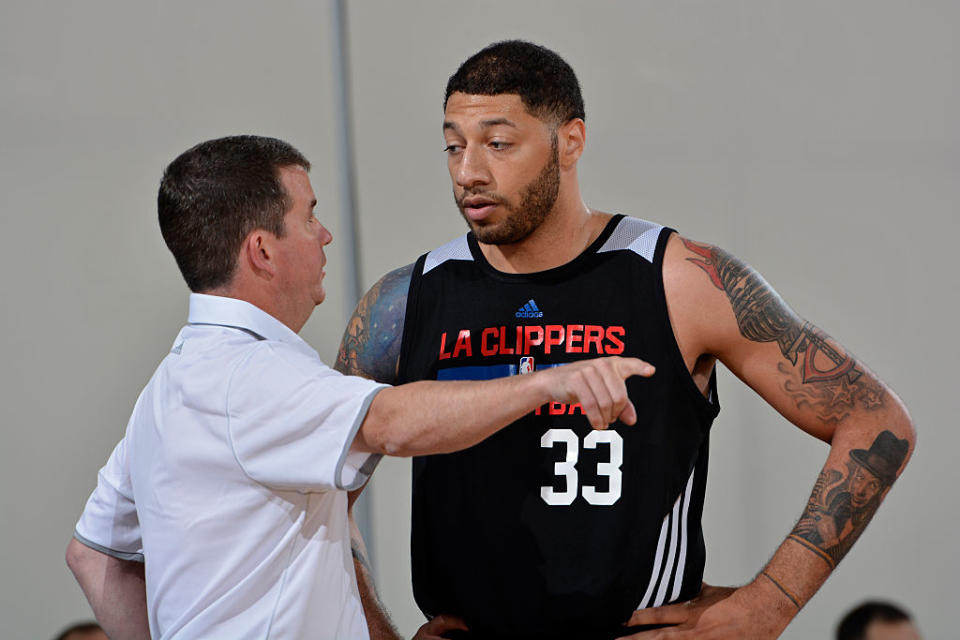Now that the NBA's talking about mental health every day, what comes next?

Last week, it was DeMar DeRozan. On Tuesday, it was Kevin Love. On Wednesday, Washington Wizards swingman Kelly Oubre Jr. became the latest NBA player to discuss his experiences with anxiety and depression.
The 22-year-old Kansas product, who has become one of the key reserves on a Wizards team looking to secure its fourth playoff appearance in five years, recently sat down to talk to Chase Hughes and Chris Miller of NBC Sports Washington’s Wizards Tipoff podcast. The third-year player discussed how being uprooted from his native New Orleans by Hurricane Katrina as a child dramatically changed his life and mindset, and about the pressure he’s felt to keep a stiff upper lip despite the hardships and challenges he’s faced along the way:
“A lot of people are coming out with things about mental health. I feel as if, yeah, man, I’ve suffered through a lot of things in my life. I’ve been through a lot of things. I can definitely relate to it all … I’m really good at keeping a poker face, because when I was growing up, my dad always told me, ‘Don’t let anybody see you weak.’ Nobody sees that I’m weak, but deep down inside, I’m going through a lot. Hell is turning over.” […]
“We’re normal human beings. We face a lot more adversity, a lot more problems … It’s a little bit more amped up, we just can’t show it. I feel like people who are on the outside looking in don’t really understand, because they see us as superheroes, but we’re normal people, man. We go through the issues that normal people go through times 10.”
Oubre praised DeRozan and Love for their willingness to open up about their own struggles — “That [expletive] is serious” — and detailed a common strategy he uses to center himself in trying times.
“I just go into a quiet place and breathe, man,” Oubre said. “Just being mindful is the only way I know how to get through any anxiety, any depression, or anything like that.”
Oubre’s comments coming on the heels of DeRozan’s disclosure to Doug Smith of the Toronto Star and Love’s first-person missive in The Players’ Tribune offers more support for the notion that these sorts of things can develop momentum — that one person opening up about a struggle can help influence another to share a story, and another, and so on, until issues that had previously been spoken about in only hushed whispers, if at all, can all of a sudden be brought out into the light and addressed without stigma, shame or fear of ridicule.
DeRozan said that reading Love’s piece, and learning that his willingness to talk about depression helped nudge Love to come forward, “made [him] feel … pretty damn good. It’s cool to be able to help someone.” Love described the response to his piece discussing his experience with panic attacks and his decision to start therapy as “overwhelming,” and said that continuing to act as an ambassador for the value of focusing on one’s mental health and getting help when you need it could become his “life’s work.”
The question, now that DeRozan, Love, Oubre, Channing Frye and others have spoken out: where does the NBA go from here?

A half-dozen years ago, Royce White started a conversation about mental health that many in the NBA community weren’t ready to have. The former Iowa State standout had repeated disagreements with the Houston Rockets, who had taken him with the 16th overall selection in the 2012 NBA draft, over how to address and manage his generalized anxiety disorder. White wanted an addendum to his player contract with the Rockets and NBA that would have enabled him to have his own personal mental health professional rather than team personnel decide when he was mentally fit to play. Later, more broadly, he wanted the league to establish a mental health policy that would govern the way stakeholders — teams, players, coaches, the union, medical personnel, everybody — behaved and interacted on matters of mental health.
White wanted it all in writing. (He’d later co-write with four doctors an open letter calling on the NBA and National Basketball Players Association to take a more active stance in the “development of a comprehensive care initiative” and mental health policy that addresses mental health as an essential benefit for all players.) He says that earned him pushback.
“Let’s say, for whatever reason, long shot, I have a panic attack in Charlotte,” White said last year in an interview with Blake Murphy of VICE Sports. “Let’s say I get a call and something happened with my family, and I get a panic attack. And it’s three hours before the game, right? And I can’t play. I’m riddled with panic. It could happen to any player, but for players with generalized anxiety disorder, it’s probably a little more likely. Are you guys going to fine me? Do you guys have the ability to cut me? Because in the policy, they do, because there’s no specific mental health policy.
“So they said, ‘Well if that happened, we’d understand, we’re not trying to [expletive] you over or anything.’ So I said ‘OK, let’s just put it in writing.’ If I have a panic attack or anything happens where I miss something team-related that has to do with anxiety, my medical condition, it will be treated like a medical condition and not like me being irresponsible. […] Not only was I not going to allow that for me, it’s just not right for anybody, anywhere, any job. The NBA should be more accountable in their role in society then to allow that type of thing to go unacknowledged.”
White and the Rockets never really got on the same page about his treatment. He spent some time with their D-League affiliate, but later got shipped to the Philadelphia 76ers so that Houston could create enough salary cap space to sign Dwight Howard. He never took the floor in live action for the Sixers.
White’s last NBA action came in nine minutes for the Sacramento Kings on 10-day contracts at the end of the 2013-14 season. After three years away from the game, he signed a deal in December of 2016 to play in Canada’s National Basketball League; he was named the league’s Most Valuable Player, averaging nearly 20 points and 10 rebounds per game.
“I won’t accept that I have to stop talking about mental health to play in the NBA, or just accept that I’ll never play. I don’t accept that. Their move,” White told VICE last year. “They distanced me from the league, mental health still knocking at the front door. Hell, it’s knocking on the whole house, really.”
The door’s open, now, in the wake of Frye, DeRozan, Love and Oubre, and Metta World Peace, and Larry Sanders, and others. The NBA world is now having conversations about mental health every day. So what comes next?
It’s my hope that from this conversation, a policy emerges that acknowledges the true nature and landscape of mental health. #BeWell
— Royce A. White (@Highway_30) March 8, 2018
Kathy Behrens, the NBA’s president of social responsibility and player programs, told Esquire last year that the league was “in the process right now” of adding more mental-health protocols to the new collective-bargaining agreement between the NBA and the players union, but that it represents “really more of an enhanced program to the offerings we have.” Michele Roberts, the union’s executive director, told SB Nation’s Paul Flannery during All-Star Weekend that all parties involved have “been naive — I’m being kind when I say naive — in thinking that we didn’t have to address and make sure that we were giving as much attention to our players’ mental wellness, as we were their physical,” and detailed the progress made in that vein:
One of the things we negotiated in the most recent collective bargaining agreement was that the league, together with the union, would devote resources to a mental wellness program.
It’s in the early stages. We’ve made one hire. We’re in the process of hiring a director. I hoped that we’d have everything up and running by All-Star. Clearly we haven’t, but we want to make sure we get the right staff so that this is the success it needs to be.
We’re working on it, but it’s a shame that this hasn’t been given attention a long, long time ago.
Would this program run through the union, through teams? How will it work?
What we’re hoping to create is that it will be run by neither. It will be funded by both, but it will be completely independent and separated from teams, league and PA. Frankly, it’s not just sports. There is a stigma attached to needing to get some help mentally.
We don’t want players to be discouraged from getting help when they need it because they’re concerned that it will get back to the team, or it may affect their play, or it may affect their next contract.
The league and the PA agreed that in order for this thing to work, it needed to be operating on its own. And that no one, absolutely no one, would have access to any information. Strict confidentiality to the extent that it can be protected.
So, we’ll see. It has to work and I’ve got to believe that we’re on the right track.
So: players are talking publicly about their battles with mental health, and the league and the players union are talking privately about creating an independent mental wellness program. Whether all that constitutes significant movement toward tangible progress in formal policy that governs the roles of the league, players and teams in helping foster better mental health among NBA players remains to be seen. It has been heartening to see, and to learn, that there’s so much more talking about this going on now than there was when White spoke up six years ago. Now, we’ll see if the increased volume comes paired with actual action.
More NBA coverage:
More from Yahoo Sports:
• NFLPA calls for combine ‘ban’ after prospect’s claim of inappropriate questions
• Infuriated UNC coach tries to rip jacket in half. Fails.
• Chloe, meet Chloe: Olympic star gets her own Barbie
• After being shot in the head, WR eyes NFL return
– – – – – – –
Dan Devine is a writer and editor for Yahoo Sports. Have a tip? Email him at devine@oath.com or follow him on Twitter!


